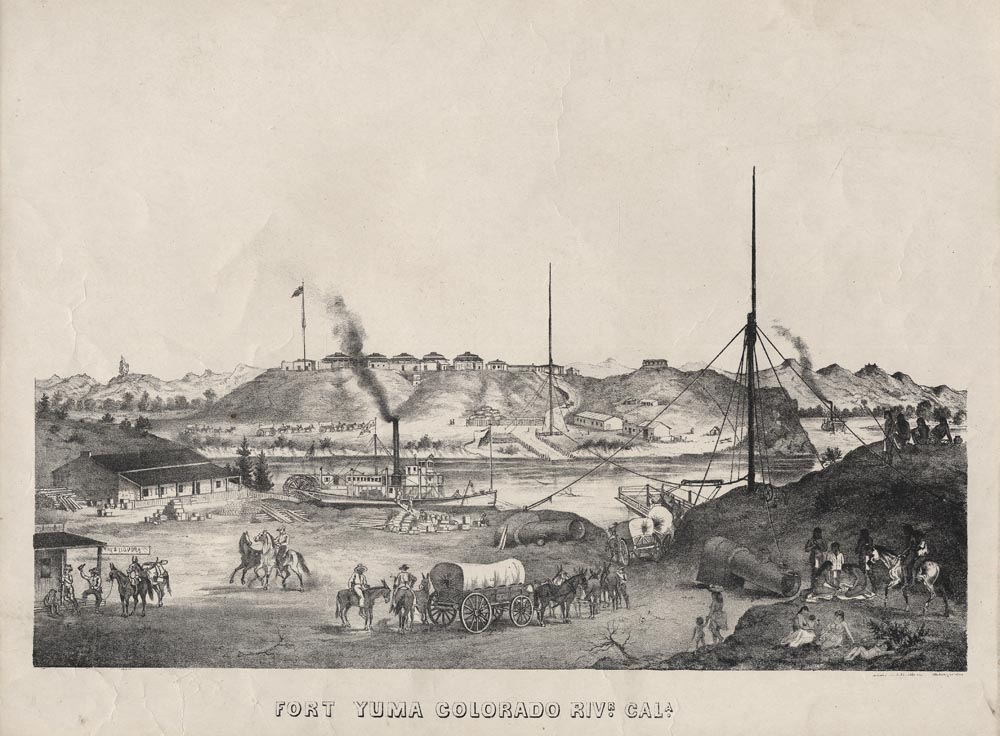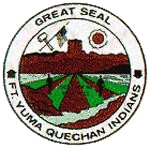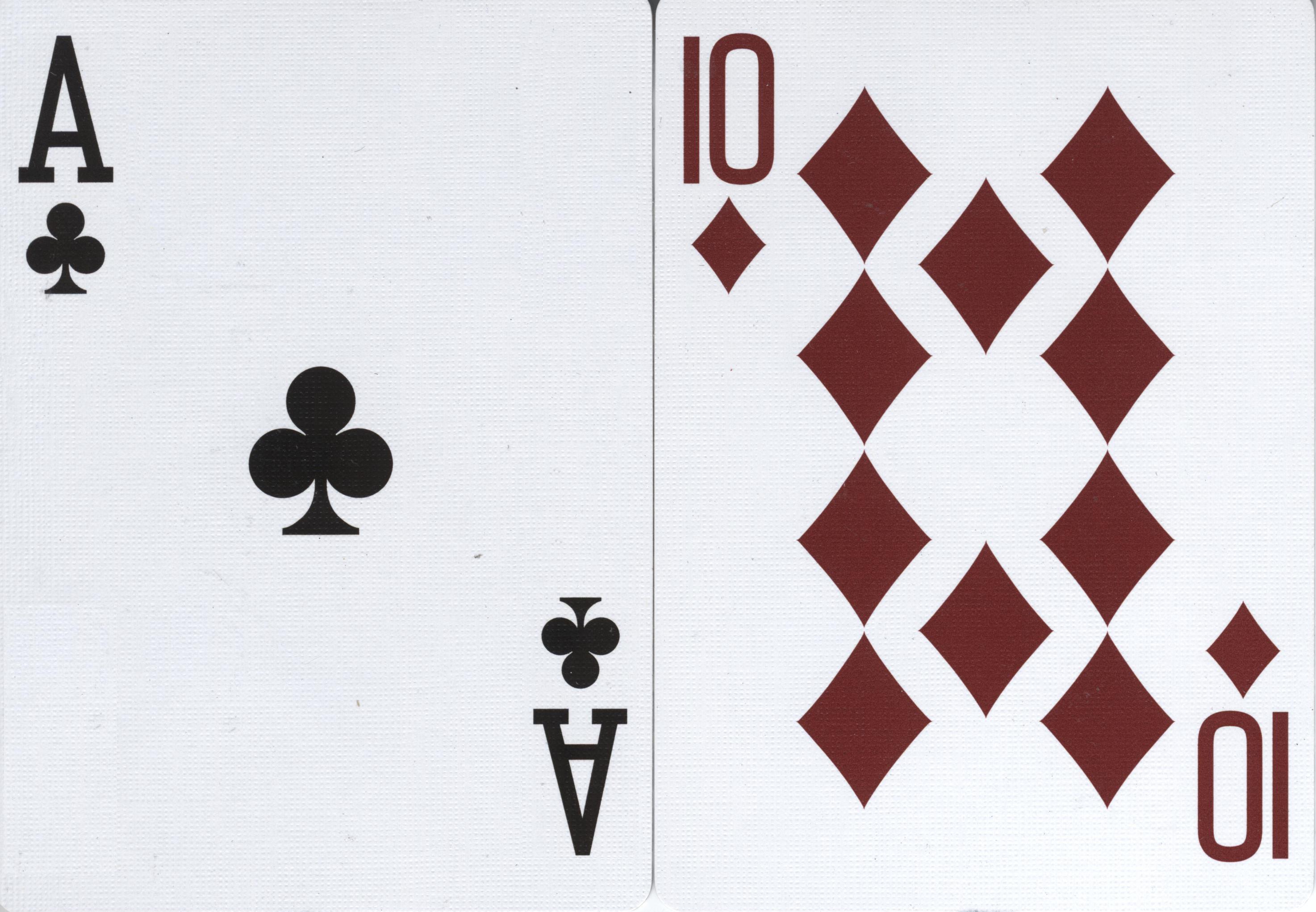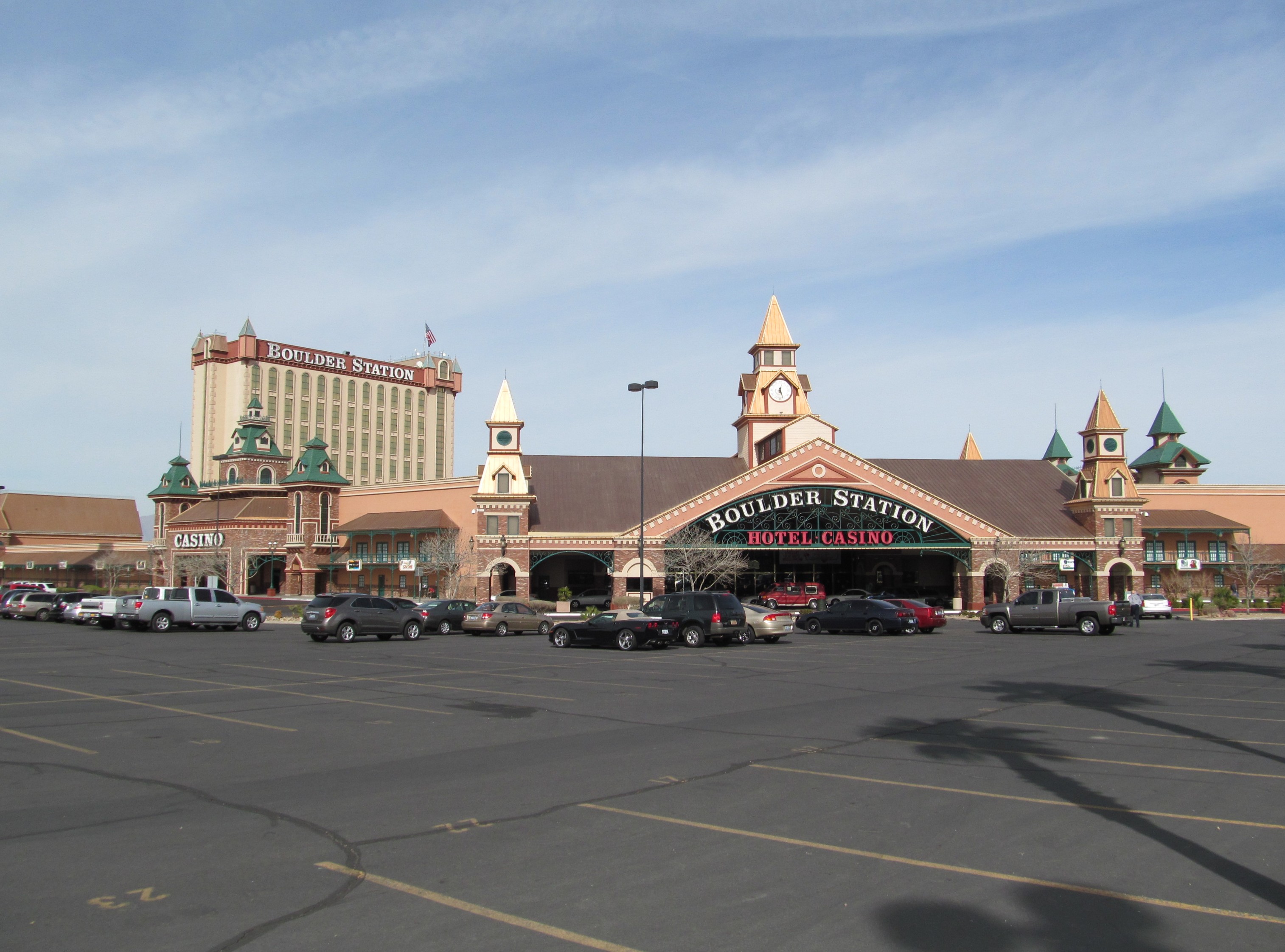|
Paradise Casino
Paradise Casino is a small tribal casino located just outside of Yuma, Arizona on the Fort Yuma Indian Reservation. The property straddles the Arizona–California state line, but the casino building lies in Arizona. It is owned and operated by the Quechan Tribe of the Fort Yuma Indian Reservation. History In 1993, the Quechan tribe signed a compact with the state of Arizona to allow construction of a casino with 475 slot machines. Construction began in January 1996. The casino opened to tribe members on July 31, 1996, and opened to the general public the next day. It was built at a cost of $13 million. In 1999, the tribe negotiated a compact with the state of California to open a casino on the other side of the state line, seven feet away from the existing casino. Operating in California would allow the casino to offer blackjack, which was not allowed under Arizona gaming compacts at the time. The extra space would also reduce crowding in the existing casino. Construction of ... [...More Info...] [...Related Items...] OR: [Wikipedia] [Google] [Baidu] |
Yuma, Arizona
Yuma ( coc, Yuum) is a city in and the county seat of Yuma County, Arizona, United States. The city's population was 93,064 at the 2010 census, up from the 2000 census population of 77,515. Yuma is the principal city of the Yuma, Arizona, Metropolitan Statistical Area, which consists of Yuma County. According to the United States Census Bureau, the 2020 estimated population of the Yuma MSA is 203,247. According to Guinness World Records, Yuma is the "Sunniest City on Earth," promising "sunshine and warm weather at least 91% of the year." Anywhere from 70,000 to over 85,000 out-of-state visitors make Yuma their winter residence. Yuma's weather also makes it an agricultural powerhouse, growing over 175 types of crops, the largest of which is lettuce. Yuma County provides 90% of all leafy vegetables grown from November to March in the United States. Yuma is also known for its large military population due to several military bases, including the Marine Corps Air Station. Yum ... [...More Info...] [...Related Items...] OR: [Wikipedia] [Google] [Baidu] |
Native American Gaming
Native American gaming comprises casinos, bingo halls, and other gambling operations on Indian reservations or other tribal lands in the United States. Because these areas have tribal sovereignty, states have limited ability to forbid gambling there, as codified by the Indian Gaming Regulatory Act of 1988. As of 2011, there were 460 gambling operations run by 240 tribes, with a total annual revenue of $27 billion. History In the early 1970s, Russell and Helen Bryan, a married Chippewa couple living in a mobile home on Indian lands in northern Minnesota, received a property tax bill from the local county, Itasca County.Kevin K. Washburn"The Legacy of Bryan v. Itasca County: How an Erroneous $147 County Tax Notice Helped Bring Tribes $200 Billion in Indian Gaming Revenue"92 Minnesota Law Review 919 (2008). The Bryans had never received a property tax bill from the county before. Unwilling to pay it, they took the tax notice to local legal aid attorneys at Leech Lake Legal Ser ... [...More Info...] [...Related Items...] OR: [Wikipedia] [Google] [Baidu] |
Quechan
The Quechan (or Yuma) (Quechan: ''Kwatsáan'' 'those who descended') are a Native American tribe who live on the Fort Yuma Indian Reservation on the lower Colorado River in Arizona and California just north of the Mexican border. Despite their name, they are not related to the Quechua people of the Andes. Members are enrolled into the Quechan Tribe of the Fort Yuma Indian Reservation. The federally recognized Quechan tribe's main office is located in Winterhaven, California. Its operations and the majority of its reservation land are located in California, United States. History The historic Yuman-speaking people in this region were skilled warriors and active traders, maintaining exchange networks with the Pima in southern Arizona, New Mexico, and with peoples of the Pacific coast. The first significant contact of the Quechan with Europeans was with the Spanish explorer Juan Bautista de Anza and his party in the winter of 1774. Relations were friendly. On Anza's return fr ... [...More Info...] [...Related Items...] OR: [Wikipedia] [Google] [Baidu] |
Fort Yuma Indian Reservation
The Fort Yuma Indian Reservation is a part of the traditional lands of the Quechan people. Established in 1884 from the former Fort Yuma, the reservation, at , has a land area of in southeastern Imperial County, California, and western Yuma County, Arizona, near the city of Yuma, Arizona. Both the county and city are named for the tribe. As of the 2010 Census the population was 2,189. In 1910, the community of Bard, California, was created after the eastern part of the reservation was declared surplus under the Dawes Act The Dawes Act of 1887 (also known as the General Allotment Act or the Dawes Severalty Act of 1887) regulated land rights on tribal territories within the United States. Named after Senator Henry L. Dawes of Massachusetts, it authorized the Pre .... In 2009, the Quechan Tribe opened a large gaming resort, the Quechan Casino Resort, on their reservation land. References {{authority control Quechan American Indian reservations in Arizona American ... [...More Info...] [...Related Items...] OR: [Wikipedia] [Google] [Baidu] |
Quechan Tribe Of The Fort Yuma Indian Reservation
The Quechan (or Yuma) ( Quechan: ''Kwatsáan'' 'those who descended') are a Native American tribe who live on the Fort Yuma Indian Reservation on the lower Colorado River in Arizona and California just north of the Mexican border. Despite their name, they are not related to the Quechua people of the Andes. Members are enrolled into the Quechan Tribe of the Fort Yuma Indian Reservation. The federally recognized Quechan tribe's main office is located in Winterhaven, California. Its operations and the majority of its reservation land are located in California, United States. History The historic Yuman-speaking people in this region were skilled warriors and active traders, maintaining exchange networks with the Pima in southern Arizona, New Mexico, and with peoples of the Pacific coast. The first significant contact of the Quechan with Europeans was with the Spanish explorer Juan Bautista de Anza and his party in the winter of 1774. Relations were friendly. On Anza' ... [...More Info...] [...Related Items...] OR: [Wikipedia] [Google] [Baidu] |
Tribal-state Compacts
Tribal-state compacts are declared necessary for any Class III gaming on Indian reservations under the Indian Gaming Regulatory Act of 1988 (IGRA). They were designed to allow tribal and state governments to come to a "business" agreement. A compact can be thought of as "negotiated agreement between two political entities that resolves questions of overlapping jurisdictional responsibilities Compacts affect the delicate power balance between states, federal, and tribal governments. It is these forms that have been a major source of controversy surrounding Indian gaming. Thus, it is understandable that the IGRA provides very detailed instructions for how states and tribes can make compacts cooperatively and also details the instructions for how the federal government can regulate such agreements. The IGRA of 1988 and tribal-state Compacts Section 3A of the Act includes specific instructions for the process of developing a tribal-state compact. Native American tribes are expected ... [...More Info...] [...Related Items...] OR: [Wikipedia] [Google] [Baidu] |
Blackjack
Blackjack (formerly Black Jack and Vingt-Un) is a casino banking game. The most widely played casino banking game in the world, it uses decks of 52 cards and descends from a global family of casino banking games known as Twenty-One. This family of card games also includes the British game of Pontoon, the European game, Vingt-et-Un and the Russian game Ochko. Blackjack players do not compete against each other. The game is a comparing card game where each player competes against the dealer. History Blackjack's immediate precursor was the English version of '' twenty-one'' called ''Vingt-Un'', a game of unknown (but likely Spanish) provenance. The first written reference is found in a book by the Spanish author Miguel de Cervantes. Cervantes was a gambler, and the protagonists of his " Rinconete y Cortadillo", from ''Novelas Ejemplares'', are card cheats in Seville. They are proficient at cheating at ''veintiuna'' (Spanish for "twenty-one") and state that the object of the gam ... [...More Info...] [...Related Items...] OR: [Wikipedia] [Google] [Baidu] |
Quechan Casino Resort
The Quechan (or Yuma) ( Quechan: ''Kwatsáan'' 'those who descended') are a Native American tribe who live on the Fort Yuma Indian Reservation on the lower Colorado River in Arizona and California just north of the Mexican border. Despite their name, they are not related to the Quechua people of the Andes. Members are enrolled into the Quechan Tribe of the Fort Yuma Indian Reservation. The federally recognized Quechan tribe's main office is located in Winterhaven, California. Its operations and the majority of its reservation land are located in California, United States. History The historic Yuman-speaking people in this region were skilled warriors and active traders, maintaining exchange networks with the Pima in southern Arizona, New Mexico, and with peoples of the Pacific coast. The first significant contact of the Quechan with Europeans was with the Spanish explorer Juan Bautista de Anza and his party in the winter of 1774. Relations were friendly. On Anza' ... [...More Info...] [...Related Items...] OR: [Wikipedia] [Google] [Baidu] |
Locals Casino
A locals casino is a casino designed primarily to attract residents of the area in which it was built rather than tourists or vacationers. The term is most commonly associated with casinos in Nevada, United States, to distinguish them from casinos that target mostly tourists in a central area. Locals casinos tend to operate under slightly different business models than those frequented by tourists, most notably having lower house advantages. Locals casinos may also have amenities to appeal to tourists, such as lodging, truck parking, and expanded dining options. Many traditional tourist casinos have tried to appeal to locals, sometimes offering more generous comps for local residents, and providing community-oriented amenities such as shopping options and movie theaters that are the typical hallmarks of locals casinos. Due to conventions related to calculating casino revenue, the term is sometimes used generally and casually to describe any casino outside of the Las Vegas Strip, ... [...More Info...] [...Related Items...] OR: [Wikipedia] [Google] [Baidu] |
Lonestar
Lonestar (formerly known as Texassee) is an American country music group from Nashville, Tennessee. The group consists of Drew Womack (lead vocals, acoustic guitar), Michael Britt (lead guitar, background vocals), Dean Sams (keyboards, acoustic guitar, background vocals), and Keech Rainwater (drums). Britt, Sams, and Rainwater co-founded the band in 1992 with original lead vocalist Richie McDonald and bass guitarist/vocalist John Rich. Rich exited the band in 1998 and went on to join Big Kenny as one-half of the duo Big & Rich. Since his departure, Lonestar has relied alternatingly on session and touring musicians for bass guitar accompaniment. McDonald exited the band in 2007 to record as a solo artist, and was replaced by former McAlyster vocalist Cody Collins before returning in 2011. After leaving the band a second time in 2021, McDonald was replaced by Womack, previously the lead vocalist of Sons of the Desert (band), Sons of the Desert. Lonestar has charted more than 20 s ... [...More Info...] [...Related Items...] OR: [Wikipedia] [Google] [Baidu] |
Buildings And Structures In Yuma, Arizona
A building, or edifice, is an enclosed structure with a roof and walls standing more or less permanently in one place, such as a house or factory (although there's also portable buildings). Buildings come in a variety of sizes, shapes, and functions, and have been adapted throughout history for a wide number of factors, from building materials available, to weather conditions, land prices, ground conditions, specific uses, prestige, and aesthetic reasons. To better understand the term ''building'' compare the list of nonbuilding structures. Buildings serve several societal needs – primarily as shelter from weather, security, living space, privacy, to store belongings, and to comfortably live and work. A building as a shelter represents a physical division of the human habitat (a place of comfort and safety) and the ''outside'' (a place that at times may be harsh and harmful). Ever since the first cave paintings, buildings have also become objects or canvasses of much artistic ... [...More Info...] [...Related Items...] OR: [Wikipedia] [Google] [Baidu] |
Casinos In Arizona
{{disambiguation, surname ...
Casinos may refer to: * Casinos, Valencia, municipality in Spain * David Casinos (born 1972), Spanish Paralympian athlete * The Casinos, an American popular music group See also *Casino (other) A casino is a facility that houses and accommodates certain types of gambling activities. Casino may also refer to: Places * Casino, New South Wales, Australia ** Casino railway station, New South Wales, Australia ** The 20th-century electoral d ... [...More Info...] [...Related Items...] OR: [Wikipedia] [Google] [Baidu] |






